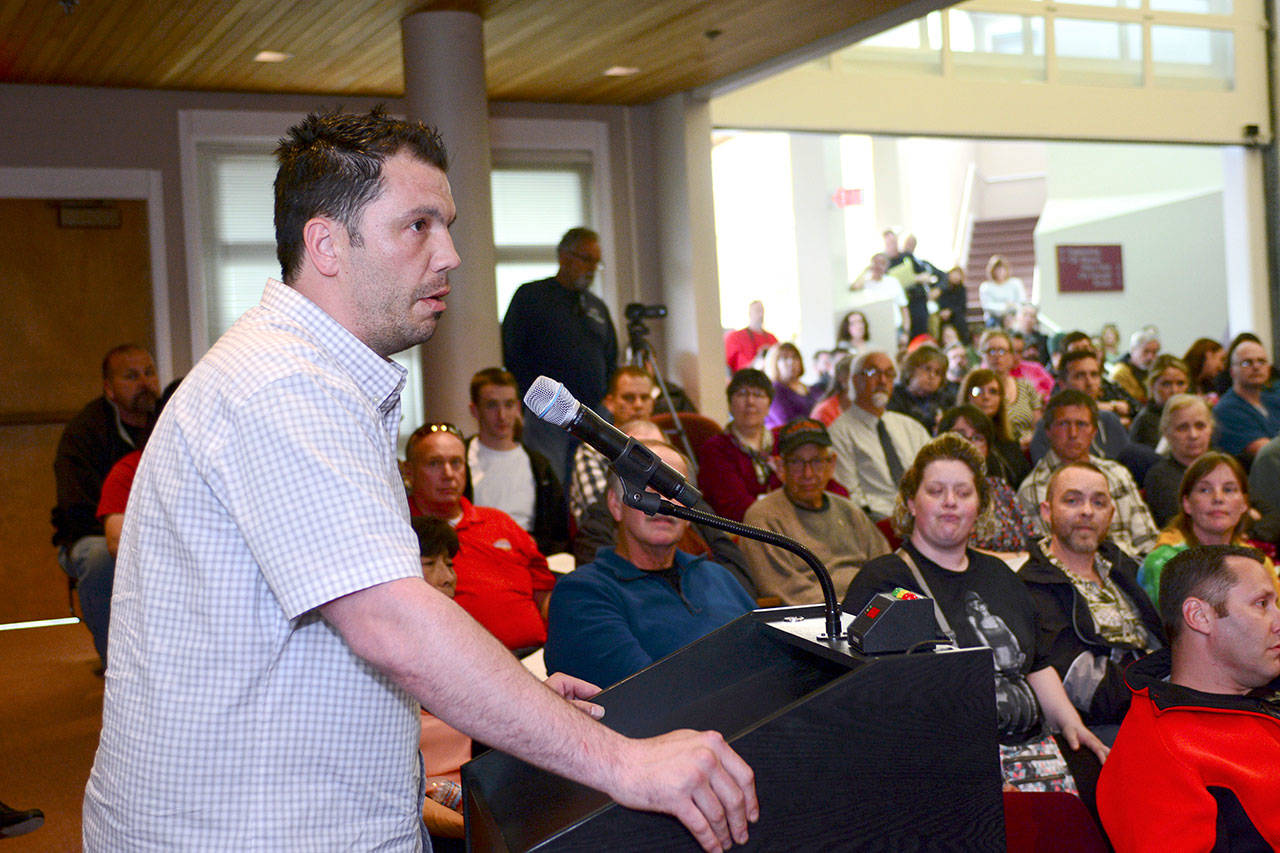PORT ANGELES — Residents who filled the Port Angeles City Council chambers and lobby Tuesday night said they were fed up with the heroin epidemic in Clallam County and asked what is being done to stop opioid abuse and what they can do to help.
Many questions were left unanswered as the two-hour opioid town hall meeting, which was attended by about 150 people, came to a halt at 8 p.m., when it was scheduled to end.
Port Angeles Mayor Patrick Downie called the town hall meeting a good start for the conversation and suggested the city council consider hosting another.
The panel of 16 professionals — made up of doctors, law enforcement, chemical dependency professionals, city and county officials, and others — often gave audience members answers they didn’t want to hear.
“It is uncomfortable to hear we’re spending public dollars on needles, yes, of course it is,” said Dr. Joshua Jones, chief physician officer for Olympic Medical Physicians, referring to the county’s syringe exchange program, which last year handed out 234,270 needles.
The goal of the syringe exchange is harm reduction, Clallam County Health Officer Dr. Chris Frank told the crowd after being asked whether the program benefits the community.
He said its purpose is to decrease the risk of hepatitis C and HIV transmission, because heroin users will use regardless of whether they have clean needles.
“We know it takes dirty needles out of the community,” Frank said. “While it doesn’t take all of them out, people want to return them.”
The exchange operates on a one-to-one basis, he said.
One unidentified person suggested that the syringe exchange mark its needles so people know whether the needles they find in parks, on trails and in parking lots are coming from the needle exchange.
Frank said needles found should be placed in soda bottles and thrown away — and that it’s not necessary to report them.
James Coon of Port Angeles, who said he and his wife took photos after finding two people apparently using heroin in a car, asked why it seems law enforcement officers seemingly don’t do anything, even when someone is clearly using or dealing drugs in public.
“[The deputy] pulled right up and the guys didn’t even go to jail,” he said.
Sgt. Tom Kuch said Washington state laws make it difficult to develop probable cause. Just seeing a used needle isn’t enough for the courts, he said.
“To take that forward in court, you have to prove they used that needle in Clallam County,” he said. “You get that with an interview, and how many are going to admit to it?”
Port Angeles Police Chief Brian Smith said the state constitution affords a higher amount of protection from searches than most people would believe.
“We have to tread carefully to be successful in a case,” he said.
The panel also talked about efforts to increase local access to Suboxone — an opioid used to treat opioid abuse disorder — and other medicine-assisted treatment programs.
Dr. Katrina Weller, chief medical officer at the North Olympic Healthcare Network, said NOHN is treating 132 people with Suboxone and is preparing to expand its efforts.
One unidentified audience member said the community likely would regret distributing Suboxone, saying it is being sold and abused.
Weller emphasized that many addicts experience permanent changes in their brains so they will never feel normal without some sort of opioid in their systems.
“I’m not giving them a medicine to further their high but to get their brain normal so they can treat their addiction,” she said.
“I know some of the prescriptions I’m writing are being sold, but I firmly believe if they are using Suboxone they got from me — instead of heroin — they are less likely to die and they are less likely to break into your house.”
Dr. Art Tordini, who provides health care to Clallam County jail inmates, said there is a need for more providers to prescribe Suboxone.
The jail has the first in-jail Suboxone program in the state. Selected inmates are provided with Suboxone before they leave jail, but only if they have have treatment lined up after they are free.
Kuch said parents need to have a more active role in their children’s lives if the drug problem is going to be fixed.
“Stay involved every step of the way,” he said. “When you start letting your kid grow up and go away, you can’t do it too soon. For every kid, there’s a different timeline.”
He said that in his 20-year experience in law enforcement, he has found too many parents who think providing food, allowance and a roof over their children’s heads is enough.
Kuch encouraged those who attended to become coaches and mentors and become a positive figure in other children’s lives.
“I believe every one of you here is for the kids,” he said. “Really, it comes down to getting the kids when they are little and teaching them how to make a good choice.
“That’s how we’re going to fix this problem.”
________
Reporter Jesse Major can be reached at 360-452-2345, ext. 56250, or at jmajor@peninsuladailynews.com.

